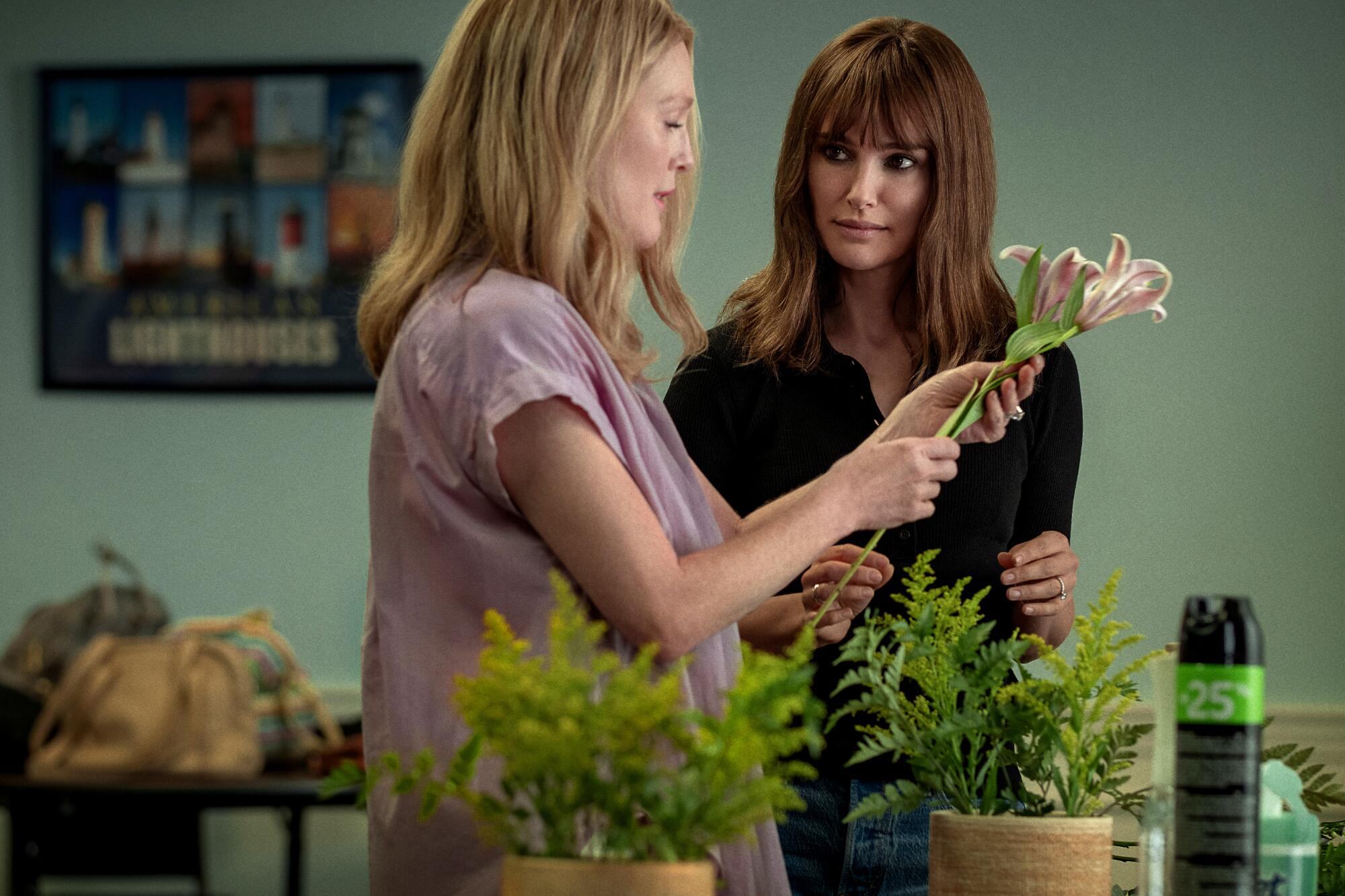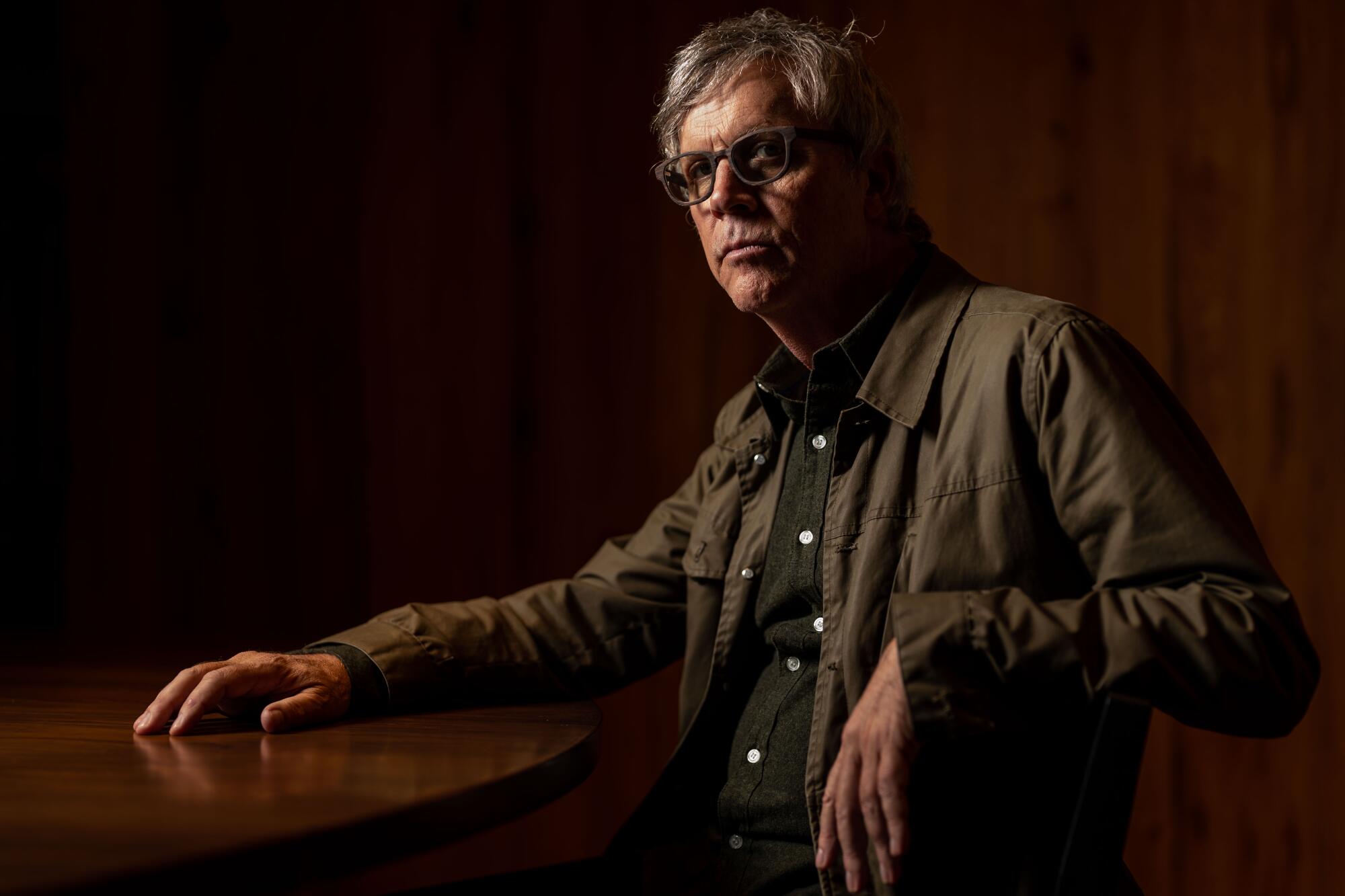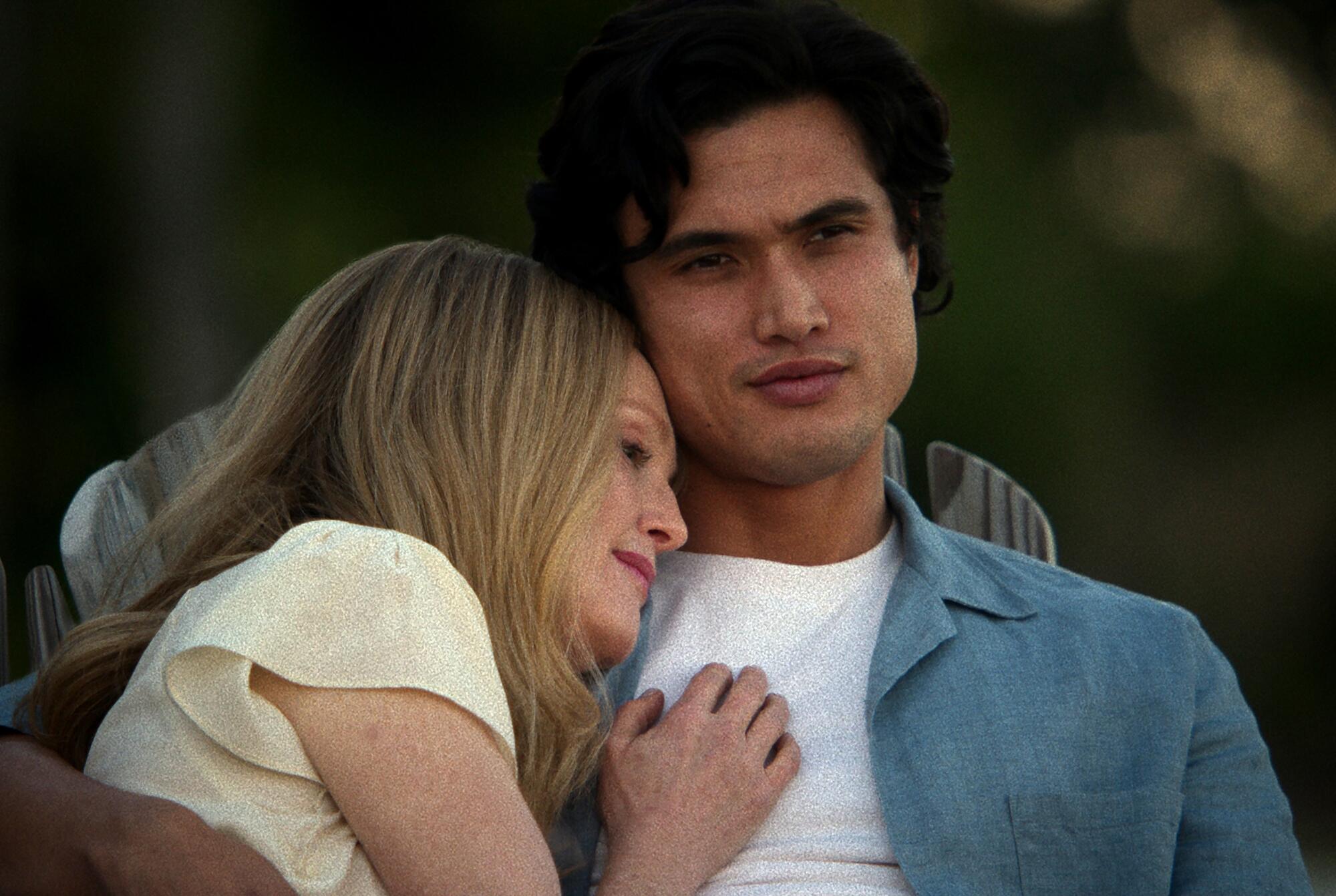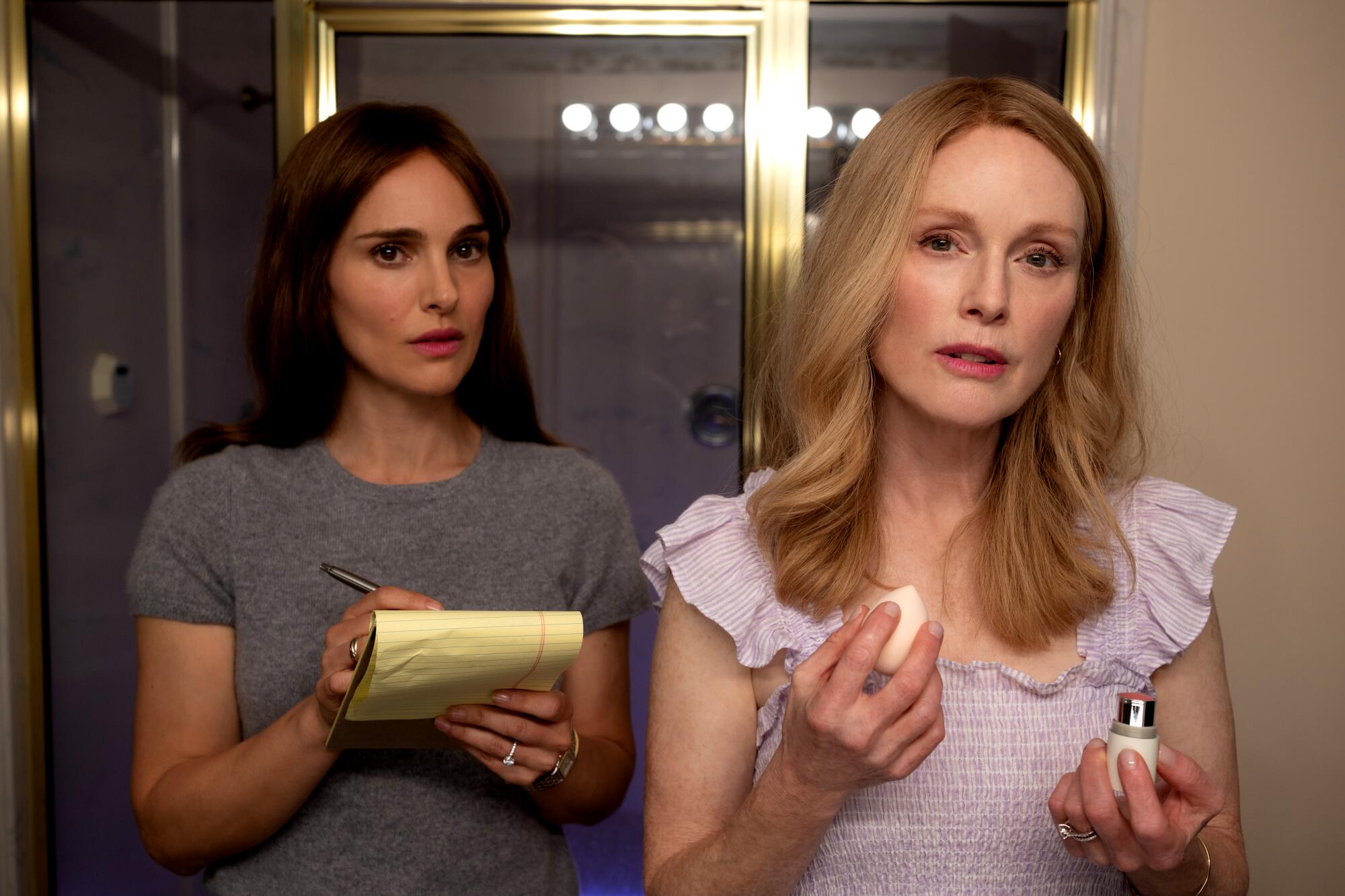
- Share via
When asked about home and where that is for him these days, Todd Haynes has three answers.
First, there’s Los Angeles, where the 62-year-old director was born and raised in the Encino neighborhood. It’s also where two of his most iconic works are set: 1995’s underbelly-of-the-Valley nightmare “Safe” and his unerringly faithful 2011 HBO miniseries of James L. Cain’s “Mildred Pierce,” starring an inspired Kate Winslet.
There is also Manhattan, a “pinnacle place,” as Haynes describes it, where his career and personal politics were rooted after he graduated from Brown University in 1985. Soon, he made his controversial 1991 feature debut, “Poison,” part of the first stirrings of what came to be known as the New Queer Cinema. In a month, Haynes will open the New York Film Festival with a gala showing of his latest movie, the masterful scandal drama “May December” (in limited release Nov. 17, on Netflix on Dec. 1), an honor that humbles him. “It’s an incredible feeling of coming home,” he says. “It really couldn’t mean more.”
But in the most literal sense, Haynes calls Portland, Ore., his base; it’s where he recently renovated a house and where he’s phoning from now. “I can’t believe it was 22 years ago when I first came here, never thinking I would stay,” he says. But the summers of the Pacific Northwest beguiled him, along with an arty scene of kindred directors. “Kelly Reichardt’s in town, and we get to go to the river together and hang out and eat blackberries and swim.”
Haynes, a generous interview, sounds like a happy homebody, which is somewhat funny. So many of his most cherished films — from the Oscar-nominated “Far From Heaven” to his Barbie doll-starring meltdown “Superstar” (about a spiraling Karen Carpenter) — turn placid suburban split-levels into sites of seething frustration.

“May December” does so to an exquisite degree. Set in marshy Savannah, Ga., the movie mainly takes place in a coastal beach house on nearby Tybee Island. It’s airy and large but, you quickly sense, not large enough.
A family lives there, one with kids on the cusp of graduating high school. The parents, 20 or so years ago, lived through a moment of intense national scandal: a seduction in the back room of a pet store. Gracie (Julianne Moore), then in her 30s and married, and Joe (Charles Melton), at the time a 13-year-old, became tabloid fodder.
But somehow, despite a brief prison stint and constant scrutiny, the relationship survived, almost in defiance of those still living with them in the same community. Now, an ambitious TV actor, Elizabeth (Natalie Portman), Juilliard-trained yet famous for lesser things, arrives to observe Gracie and her husband, researching the role that she hopes will break her out of her lane.
“I loved how small and entrenched and inescapable the prejudices and morals that would be imposed on these people would feel in a small town,” says Haynes. The screenplay, by newcomer Samy Burch, was originally set in starchy New England, specifically Camden, Maine. (“It’s the sort of secret setting for ‘Peyton Place,’ the director says of the 1957 Lana Turner film.) But the availability of his cast required a shift — a happy one, as it turns out.
It’s not hard to get Haynes talking about one of his favorite subjects, the high-toned melodramas of the 1950s — not to be confused with the way the term is used today, as a synonym for overwrought.

“Women are at the apex of those stories,” he says. “Women become this incredibly rich subject matter when they are embedded in the social system and not necessarily free to make their own choices. When difficult and contradictory issues arise in domestic settings — all of that is combustive. That’s where most of my films have kept going back to for their inspiration.”
Christine Vachon, co-founder of Killer Films and Haynes’ longtime producer (they met when they were students at Brown), says she often knows when a script will appeal to him.
“When I read ‘Carol’ for the first time, I knew it was something he was going to want to do for a lot of different reasons,” she says, “and I think with ‘May December,’ we felt pretty strongly that it would strike a chord.”
But Vachon is quick to add that Haynes doesn’t repeat himself.
“He’s always had a directorial assurance — he had that on ‘Poison,’” she recalls. “And there are some directors who make the same movie over and over again, and sometimes it’s a really good movie, so it’s OK. But Todd really doesn’t do that. He brings a level of originality because he loves to explore himself.”
Subjects explored in “May December” with a level of acuity that suggests Haynes may only now be hitting his full stride include fame, aging, blackmail and the lies told in marriages to keep the peace. “It‘s about the ways we hunker down and settle into decisions about our personal lives and are not inclined to question them,” he says, “even when they should be.”
The director also benefits from a reputation for getting fearless work out of even the most established stars. Vachon confirms that Burch’s script came to her via Portman herself, who was originally offered the chance to direct.
“I believe Natalie’s response was, ‘The script is amazing, and I want to play this role, but let’s send it to Todd Haynes,’” Vachon says.

Haynes remembers being thrilled by Portman’s embrace of Elizabeth’s more vicious, scheming side, even the possibility that viewers might see Portman as manipulative too. “She was really ballsy about wanting to invite those readings into the movie,” he says, “the incredible sense of disquiet that the script presented to her as a reader.”
He pauses, reflecting for a moment. “She was reminding me of a kind of a boldness and risk-taking that I associate with Julie.”
Julie is, of course, Julianne Moore, making her fifth collaboration with the director in a performance that, even after “Safe” and “Far From Heaven,” registers as shattering. Haynes is protective of their private relationship, implying a deep respect. “We have a lot to live up to in the work that we’ve done together,” he says.
He doesn’t seek out projects for her but is excited when they come his way, and he remains dazzled by Moore’s creativity. For her turn as Gracie, she perfected an infantilizing lisp, taken from her viewings of videos of Mary Kay Letourneau, the real-life Washington state schoolteacher whose 1990s affair with a sixth-grader was a clear influence on Burch’s scenario.
“We were calling it the ‘princess syndrome,’” Haynes says. “The whole way that Joe’s character is drawn as somebody who is going to rescue the damsel, the princess, who is living in a kind of discontent in her domestic life. It’s almost like a corrupt, twisted kind of fairy tale. And it was driven by Julianne. It was her insistence in looking back at that source material.”

“May December” is a feast of powerhouse acting, with Melton’s unhappy Joe, pinned in by expectations, step for step with the women. As an aural counterpoint, Haynes adds a dash of heightened orchestral menace: a quotation from Michel Legrand‘s score for the 1971 film “The Go-Between,” starring Julie Christie as an aristocratic young woman who embarks on a forbidden romance with a tenant farmer. It’s both a signal to the audience to have fun and a playful tilt toward meta.
“It appeared on TCM, as things often do,” Haynes says, the image of his cozy Portland evenings coming into view. “And you’re like, holy s—. The music immediately makes itself apparent and sits right in front of the story. And I love that. It hearkens back to what movies used to do as I was coming of age as a filmgoer — that sense of it being a dilemma, something that you were going to have to think about and discuss and analyze.”
For Haynes, those early favorites, the ones he returns to, include Alan J. Pakula‘s pitch-black ’70s conspiracy thrillers, the elliptically edited mysteries of director Nicolas Roeg and, when he got a little older, the impulsively sexual dramas of Germany’s Rainer Werner Fassbinder, whose “The Bitter Tears of Petra von Kant” plays like an older cousin to “May December.”
Can it be that the director of “Superstar” hasn’t seen Greta Gerwig’s “Barbie”? By this interview, at least, Haynes is embarrassed to admit as much. “I don’t even know if I want that reported,” he says with a laugh. “If this kind of bonanza is going to happen to anybody in our industry in terms of sheer success, I couldn’t wish for a better recipient than Greta Gerwig.” (He has seen “Oppenheimer,” meanwhile, and “really enjoyed” it.)
Then again, that’s not much of a surprise. Haynes has always been indie to the core, more comfortable outside the mainstream, and never one to shy away from sincerity. He thinks of America as being in a “state of emergency” and of art as a conduit to the kind of nuance that’s being lost.
“There’s a hunger to be put in a condition of not knowing exactly how you feel morally and ethically about the subject matter in this movie,” he says. “And that‘s not a typical mode that we’re in these days. Things are all too clear, all too quickly. We have a lot further and deeper to go, but I’ll take what I can get.”
More to Read
Only good movies
Get the Indie Focus newsletter, Mark Olsen's weekly guide to the world of cinema.
You may occasionally receive promotional content from the Los Angeles Times.










